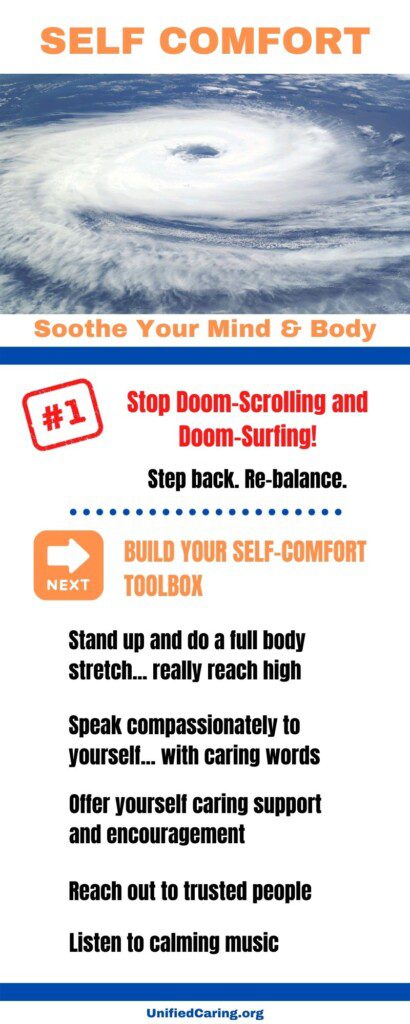In these turbulent times, you’ve probably observed that just about every news story is overwhelmingly about things we can’t influence or control, and ultimately this leaves us feeling unable to help, or make a change. It’s easy to get hooked on this headline distress – there’s even a new name for the excessive amount of screen time devoted to the absorption of dystopian news: “Doom-Scrolling” or “Doom-Surfing.” Where’s the comfort needed from the storm?
If you find yourself continuing to scroll or surf through bad news, even though that news is saddening, disheartening, or depressing, you need to stop or step back – you need to re-balance with something comforting. That’s because simply hearing bad news can feel like an attack on the comfortable worlds we have built around us. Consuming too much makes us feel bombarded, increases our stress levels, and leads to rising feelings of anxiety.
In fact, that sense of unease is the origin of the word “dis-ease.” So it’s no wonder that feeling low, helpless and stressed are common side effects of the perpetual news cycle we’re all living in.
If you’re anxious, sad or overwhelmed, it’s time to make a change and trade the news for some soothes. To do so, it helps to have a collection of comforting — and healthy — tools you can turn to.
Self-Care vs. Self-Comfort
Much has been said and written about self-care, because it’s so important. But we don’t hear as much about its fraternal twin . . . self-comfort – the ability to truly soothe your mind and body. And here’s some good news you can use: self-comfort doesn’t require more money or more time – just healthy strategies.
For example, we store anxiety in our body, so the simple act of standing up and doing a full-body stretch is an easy way to comfort yourself anytime.
Speaking compassionately to yourself with consideration and care – by extending the same kindness to your inner-self as you would to a good friend is another form of effective self-comfort.
See if you can introduce more compassion into your internal dialogue in response to unkind self-talk.
Offer yourself encouragement and support when you can. Speak to yourself gently, as you would to a loved one, with phrases such as: “You’re doing the best that you can,” “You’re allowed to make mistakes,” You’re allowed to feel disappointed, and that’s okay,” “Your best is good enough,” “Your feelings are real, and really important.” The key to self-comfort is making sure that you really believe the caring things that you say to yourself.
If you’re not quite yet in a place where you believe that you’re allowed to make mistakes, at the very least, you can compassionately acknowledge your reality at the moment with constructively comforting self-talk like this instead: “You find it really painful when you make a mistake – it’s understandable.”
The opposite approach of self-talk works too, when we reach out to people we trust to support us. We’re all wired to connect with others and to comfort each other emotionally and physically, so don’t be shy about seeking that connection.
Music Has Charms
One of the most mis-quoted phrases is: “Music calms the savage beast.” The phrase actually comes to us from a poem written by William Congreve in 1697: “Music has charms to sooth a savage breast, to soften rocks, or bend a knotted oak.” As you can see, no “beast” involved, but rather the “breast,” which in 1697 meant the heart, or emotions.
More than 400 years later, it’s still true. The benefits of listening to calming music – pairing soothing tunes with deep breathing can even lower your blood pressure. So give the Netflix binging a break and instead create your own playlist of comforting songs that help you to slow down or connect with positive memories and experiences.

Unicorns & Cotton Candy
When considering self-comfort, it’s important to remember that the goal isn’t to fix your feelings right away. So, don’t find fault in yourself if you aren’t seeing unicorns and cotton candy skies within the first 10 minutes. The important thing is that you’re building a self-comfort toolbox of healthy strategies to turn to any time you need it. Sometimes the most comforting thing is to just simply say you’re having a really crappy day.
Every feeling has a purpose, because feelings send important messages that tell us something isn’t quite right, and it’s time to re-balance. With healthy habits to choose from, you can reach for some self-comfort when you’re ready to feel better.
Now isn’t that a comforting thought?
By Mark Smith, contributing author
We invite you to discover inspiring and effective ways to care for yourself and to serve others. Now more than ever, caring is what we all need most. Caring for our self. Caring for others around us. Life now demands caring, resilience and compassion like never before. So, become a Custodian of the Caring Movement and help create the world we need right now, the world we want for our future generations.
UCA resources available to help include the Turbulent Times Resources Center, radio show, publications and online store offering members huge discounts and always free shipping.

